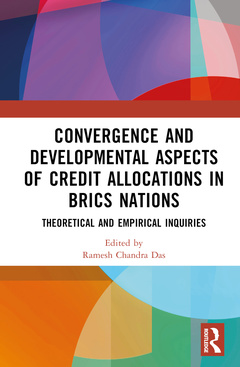Convergence and Developmental Aspects of Credit Allocations in BRICS Nations Theoretical and Empirical Inquiries
Coordonnateur : Das Ramesh Chandra

This book explores the levels of cooperation and the phenomenon of convergence among BRICS nations. It provides an in-depth look into the financial and banking systems among these rapidly developing economies and the steps they have taken to foster development and counter inequalities.
Of the many factors in determining the income and wealth of a country as well as a group of countries, commercial bank credit, a well-known financial indicator, has been an important one. This book analyses the governance and structure of the New Development Bank and its effects on group members for peer growth and to defend against any external economic and political shocks. It looks at how much of an influence the commercial bank credit, or simply the credit, has upon the income levels of the BRICS member countries, how equitable they are, whether they are converging in credits and incomes, and other such issues. It also focuses on India?s credit aspects of inclusiveness and convergence.
With a strong empirical model estimation, this book will be of interest to students and researchers of economics, finance, management, political studies, international relations, and international trade.
List of Figures. List of Tables. List of Contributors. Foreword. Acknowledgements. List of Abbreviations. Introduction Part I: Growth and Convergence Aspects of Financial Instruments in the BRICS Nations 1. New Development Bank: How it is New? 2. Convergence of Banking Expansion in BRICS countries: An Empirical Study 3. Convergence Analysis of Monetary Sector’s Credits in BRICS Nations 4. The New Development Bank for BRICS: Convergence of Emerging Economies for Development Cooperation 5. Quality of Bank Credit and Its Implications for Sustainable Growth: A Macro-Theoretic Introspection with reference to BRICS Nations 6. Newly Created Contingency Reserve for Pursuit of Smoother Trade: Evidence from BRICS 7. Role of Domestic Credit vis-à-vis Foreign Credit on BRICS Countries’ GDP and Export Growth 8.Inter-connections between financial sector and real sector: A new empirical investigation for BRICS nations 9. Remittances and its Impact on the Extension of Credit by Banks: A Panel Evidence from BRICS countries 10. Time and Growth Rate Required for the BRICS to Converge within Group as well as to Catch up G7 Countries 11. The nexus between uncertainty and credit growth in BRICS countries 12. A Quadrangular Analysis of Exports, Imports, Economic Growth and Exchange rate in the Post-liberalization Era — Evidence from BRICS 13. Capital Inflow and Financial Status of the Indian Economy: An Empirical Analysis Part II: Aspects of Sustainable Development in the BRICS Nations 14. Has Credit Growth led to Inclusive Development in BRICS Countries? A Panel Data Analysis 15. Financial Inclusion, Digitalization and Economic Development: Empirical Evidence from BRICS Countries 16. The Impact of Financial Development on Energy Investments for BRICS countries 17. Roles of Credits in BRICS Countries in Mitigating Climate Change and Supporting Sustainable Development and Economic Growth18. Foreign Direct Investment, Economic Growth and the Environment: A Review of Environmental Degradation in BRICS 19. Inclusive Human Development and Growth in BRICS - An Empirical Insight 20. Good Governance for Inclusive Development: A Comparison of Bangladesh with the BRICS Member, India 21. BRICS Through the Prism of New Delhi: A Cautious and Limited Engagement 22. The Present Scenario of BRICS: Economy, Expansion and Challenges 23. Bank Credit, Community Participation and Inclusiveness: Evidences from Eastern India. Index.
Ramesh Chandra Das is Professor of Economics at Vidyasagar University, West Bengal, India. He has more than 25 years of teaching and research experience in different fields of economics consisting of theoretical and applied macroeconomics, financial economics, environmental economics, and political economics. He has contributed numerous research papers to journals and books and has edited and written more than a dozen books published by leading publishers.
Date de parution : 06-2024
15.6x23.4 cm
Thèmes de Convergence and Developmental Aspects of Credit... :
- direction / stratégie d'entreprise
- Initiation à l'économie, théories et études économiques
- Économies et politiques économiques mondiales : relations économiques internationales / douanes, exportation
- Gestion financière
- Sciences politiques
- analyse, budget, trésorerie, financement, investissement, gestion prévisionnelle



